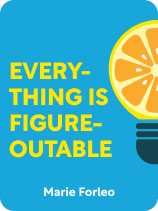

This article is an excerpt from the Shortform book guide to "Everything Is Figureoutable" by Marie Forleo. Shortform has the world's best summaries and analyses of books you should be reading.
Like this article? Sign up for a free trial here.
What’s holding you back? Do you want to overcome life’s toughest obstacles?
Even if you have goals in life, you still might not do anything to pursue them. In Everything Is Figureoutable, Marie Forleo writes that there are three reasons for this: You deny your agency, you don’t see the point, or you’re afraid.
Below, we’ll discuss these barriers in detail.
1. You Deny Your Agency
The first reason you may not go after your dreams is that you believe you’re unable to. However, Forleo argues that in most cases, when you say, “I’m unable to do this,” when thinking about what’s holding you back, what you really mean is, “This is not a priority for me.” Using the word unable allows you to deny the agency you have over your own life. She recommends adopting the mindset that you are totally in control of your life—at least over your actions and how you respond to circumstances. Recognizing that you have control forces you to become more proactive and to solve any issues you may face.
(Shortform note: In The Subtle Art of Not Giving A F*ck, Manson agrees that you must take responsibility for your life, as you can always choose what you think and how to behave in any situation. Further, he points out that denying your agency and refusing to accept the control you have is also a choice you’re responsible for. Therefore, the question isn’t whether you believe you’re in control of your life but rather what values you’ll base your decisions on: Will you choose to be proactive and solve your issues, or will you continue to ignore your agency?)
Forleo notes two common ways we try to deny our agency.
1) We believe we lack the time to pursue our dreams. If this is you, spend a week recording how you spend your time, then look for ways to free up two hours each day; you likely can do so by limiting how much time you spend on your cell phone or watching TV.
(Shortform note: In 168 Hours, Laura Vanderkam contends that to find the time to pursue your dreams, you must actively schedule your week around your priorities. To do so, she also recommends that you spend a week recording how you use your time. Then, instead of looking for how you can free up bits of time that might eventually add up to two hours, schedule your priorities first—and either eliminate or reduce unimportant tasks (like spending time on your cell phone or watching meaningless TV shows).)
2) We believe that we lack money. If this is you, look for free courses that will teach you what you need to know; alternatively, sell your possessions, apply for a scholarship, or get a part-time job to cover your expenses.
(Shortform note: In The Power, Rhonda Byrne suggests that if you have negative feelings about money (like believing that you lack it), you’ll repel it. So even if you find free courses, get a part-time job, sell your possessions, or receive a scholarship, you’ll lose all this money and benefits unless you transform your relationship with money and start having positive feelings about money. To develop these positive feelings, Byrne recommends that you react positively to any situation involving money, such as by only paying bills when you’re in a good mood.)
2. You Don’t See the Point
The second reason you may not pursue your goal is that you don’t see the point—after all, other people have already done it. You assume you don’t have anything novel or unique to offer the world, so there’s no point in trying. However, Forleo argues that nobody else has pursued this goal in exactly the way you have: You possess a unique combination of experiences and expertise you can apply to your goal, and if you don’t pursue it, you’re robbing the world of something valuable.
(Shortform note: If you’re refusing to pursue a goal because you think you have nothing new to offer the world, you may be operating from a “scarcity mentality,” which The 7 Habits of Highly Effective People author Stephen Covey defines as a belief that there are limited resources, and one person’s success must come at the cost of another’s. Instead, adopt an abundance mentality—a conviction that one person’s success doesn’t come at the expense of another’s. This will allow you to pursue your goal even if other people have done something similar because you know that the world has room for both of you to succeed.)
To illustrate, Forleo describes how, despite her husband’s best efforts, she didn’t start to eat healthily until she encountered the work of wellness activist Kris Carr. Had Carr never pursued her dreams, Forleo might never have changed her diet—even though her husband spent years telling her the same things she learned from Carr.
(Shortform note: Why was Forleo receptive to Carr’s advice but not her husband’s? It may be because Forleo’s husband advised her on healthy behavior while Carr both advised her on and modeled healthy behavior. Psychologists note that we often respond poorly to advice because we resent being told what to do. However, we respond well to modeling; when people exemplify desirable behaviors that have clear benefits, we naturally want to copy them.)
3. You’re Afraid
The third obstacle to believing all issues are solvable and that you can reach your goals is being afraid. Forleo gives guidelines for tackling fear in general as well as four common fears: fear of pursuing your dreams, not being ready, not being good enough, and being an imposter.
Forleo argues that while fear can be a warning sign that you’re about to make a mistake, it can also be a good thing: If you’re afraid to do something, it’s often a sign that you care deeply about it—and so should do it.
To determine what exactly your fear is telling you, try this exercise: First, relax your body by taking several deep breaths. Then, ask yourself whether doing the thing that scares you makes you feel open or closed off—and pay attention to how your body reacts. If you feel enthusiastic and like a weight has been lifted, that’s a good sign. If your muscles tense and you feel nauseated, consider holding off.
Assuming that your fear is a good sign, how can you push past it? Forleo recommends against waiting for your fear to dissipate because it will only fester. Instead, you must act despite your fear—which is the only way to beat it. In other words, you must do the thing that scares you despite being afraid. This is the only way to become braver—and the braver you become, the more willing you’ll be to tackle new challenges.
One area in which the power of acting despite your fear is particularly evident is when you learn a new skill. Forleo explains that the skills you’re confident in are in your “comfort zone,” or zone of safety, and the skills you don’t yet have are in your “growth zone,” or zone of improvement. Initially, you’ll struggle to tackle skills in your zone of improvement—but as you get better at doing them, your zone of safety will expand to include these skills. The more you expand this zone of safety by learning new skills, the more confidence you’ll gain and the more willing you’ll be to tackle new challenges in your zone of improvement.

———End of Preview———
Like what you just read? Read the rest of the world's best book summary and analysis of Marie Forleo's "Everything Is Figureoutable" at Shortform.
Here's what you'll find in our full Everything Is Figureoutable summary:
- How to apply the "everything is figureoutable" philosophy to your life
- How you can achieve your dreams and overcome all obstacles
- How to respond when you encounter criticism






